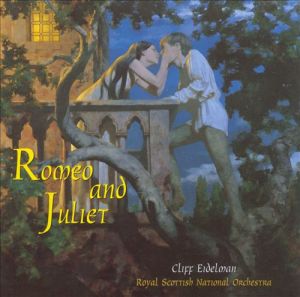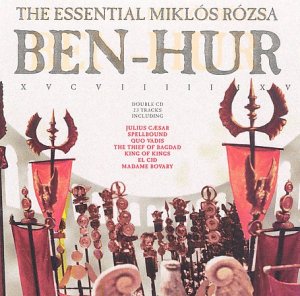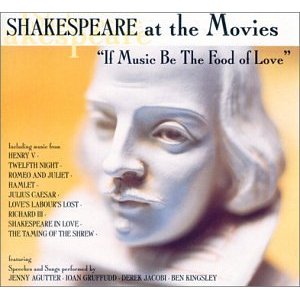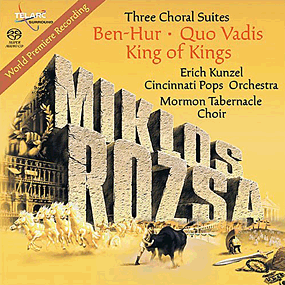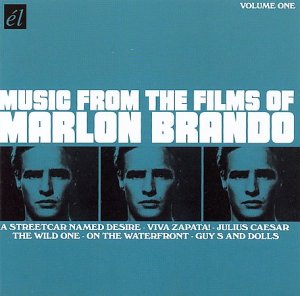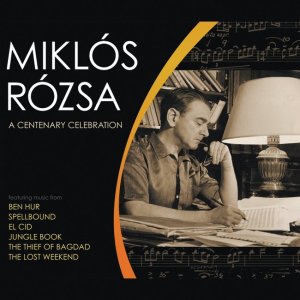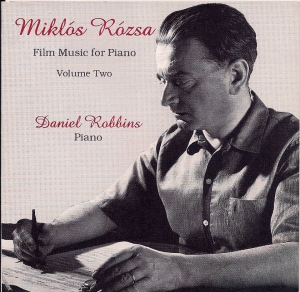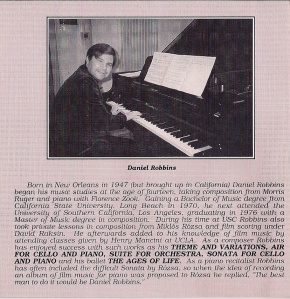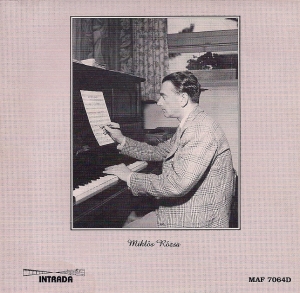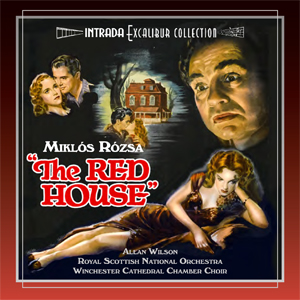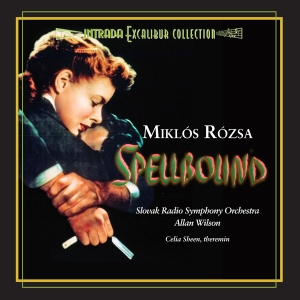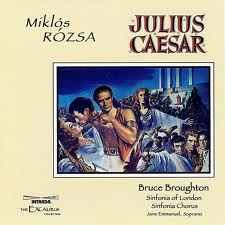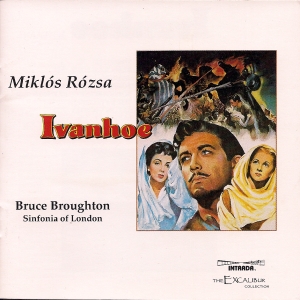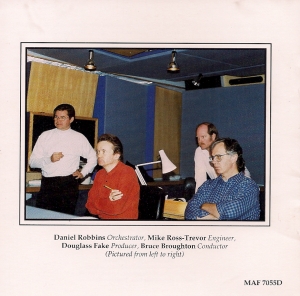from Film Score Monthly
Inevitably, Dr. Rozsa’s ongoing medical problems during the 1990s prevented our having lessons and visits. I greatly missed him and was determined to re-establish contact, illness notwithstanding. What was needed was a viable means of implementing my ardent ambition. At this time, the noted Hollywood journalist Tony Thomas proved to be Dr. Rozsa’s loyal devotee and held a privileged friendship with him. Tony assiduously protected the ailing composer’s professional interests, which included overseeing all correspondences. Adhering to a strict weekly visitation regimen, he also monitored who was permitted access to Rozsa, on which days, and for how long a time. Thus it appeared that Tony Thomas could be the golden re-entry back to my association with Miklos Rozsa. I wrote to Dr. Rozsa expressing my fervent wish to see him again and that I would arrange the meeting through Mr. Thomas. I was of course certain that it would be the selfsame Tony Thomas who would read my letter to Rozsa. This tactical plan worked perfectly. When I introduced myself over the phone to Tony as a mutual friend of Miklos Rozsa, he already knew my agenda and graciously invited me to accompany him on his next sojourn to Rozsa’s Hollywood Hills home. Said Tony, “I know you write to Rozsa because I’ve seen your correspondence.” The day of our visit revealed a changed state of affairs at the Rozsa domicile from the last time I had been there. The meeting place for socializing had shifted from Dr. Rozsa’s spacious living room to a small cozy office serving as his sole living quarters. In close proximity was a tall bookcase overflowing with art books, a modest-sized bed, and a writing-desk. Atop the desk were several inspired portraits of the main personages from Ben-Hur painted by Dr. Rozsa’s former friend and filmographer, the late James Pavelek. Impressive among the art work decorating the walls was an original etching by Rembrandt. As additional culinary embellishment to the intimate atmosphere, Rozsa’s celebrated tradition of European refreshments included tea and cookies served by his dedicated nurse and caregiver Irma. Tony Thomas enthusiastically presented me to Dr. Rozsa, saying, “Look who I’ve brought to see you, an old friend!” But being in the company of Miklos Rozsa after my long absence presented a new and vivid picture of his advancing age and physical infirmities: a thin froth of snow-white hair had replaced the long salt and pepper locks of earlier years; the intelligent and penetrating eyes remained fixed in a downcast gaze; his dignified and confident walk was now permanently enchained within the confines of a wheelchair; and the resonant voice, once richly adorned with a royal Hungarian accent, had grown weak and tentative in its slurred speech patterns. But despite his impaired condition, one could nevertheless discern the Miklos Rozsa of previous days. His facial expressions still projected an aristocratic European elegance. Perceptual awareness, reasoning, power of concentration, and an ever-present sense of humor were all intact. Even the firm Rozsa handshake continued to transmit emotional warmth and reassurance, though its grip now showed a noticeable reluctance to end. So enjoyable was the mood and conversation at our meeting, I was immediately awarded honorary membership in the Rozsa/Thomas weekly sessions. For 3 years visitation protocol varied little from week to week. Every Wednesday afternoon I picked up Tony at his Burbank home before making the long, steep, dramatic drive up to Dr. Rozsa’s hilltop mansion. Once within its massive iron gates, we climbed the tall stairwell to the front door. At this point it was apparent that Tony Thomas was considered a most familiar and welcomed guest to the Rozsa household, as he always opened the door without ever ringing a bell, knocking, or announcing his presence in any fashion. Entering the house, we traversed a long carpeted hallway, walked through the music studio, down a shorter hall, past a small bathroom, and into the office-room where Dr. Rozsa eagerly awaited our timely arrival. One week was rendered particularly unforgettable due to a small cassette tape innocuously sitting on Dr. Rozsa’s desk. Sent by KOCH CDs, it was the pre-release master of Miklos Rozsa’s Symphony in 3 Movements. With performance permission only recently granted by its composer, the work had remained virtually unplayed since its composition in 1930. The new KOCH recording, featuring James Sedares and the New Zealand Symphony, was at last offering a belated world premiere of this deserving Rozsa opus. Hearing the newly resurrected symphony in the presence of its creator and Tony Thomas was a singularly historic experience, even as their individual reactions to the music were the epitome of paradoxical contrast and irony. As the magnificence of the work engulfed the room, a most amazing and incredible scene ensued: First movement: following its stern and commanding introductory pedal tone, a veritable plethora of noble and expressive themes and moods. Rozsa: expressionless. Tony: attentive and discerning. Second movement: impassioned melancholic lyricism and pastoral instrumental tone-painting in the composer’s most imaginatively impressionistic vein. Rozsa: expressionless. Tony: emotionally moved and intrigued. Third movement: frenetic energy and impulsive rhythms evoking the unbridled spontaneity of indigenous Hungarian folk music. Rozsa: still expressionless Tony: uncontrollably enthusiastic, making powerful conducting gestures in the air. After the final explosive chord Tony sprang to his feet ecstatically praising the composer: “Bravo! An astonishing piece!” Rozsa: silent. Tony: “The definitive blending of authentic Eastern folk music with the Western symphonic tradition!” Rozsa: steadfastly unresponsive. Tony: “A major orchestral achievement of the century!” Rozsa: yet unresponsive. Tony, pleadingly leaning into the maestro’s face for eye-to-eye validation: “Well? What are your thoughts? What have you to say about your own music?” Rozsa, sotto voce, calmly, wryly: “Have some more tea.” Periodically, famous colleagues of Miklos Rozsa wishing to pay their respects would join us at Dr. Rozsa’s house. One such celebrity was Ray Harryhausen, legendary dynamation wizard with whom Rozsa had collaborated on The Golden Voyage of Sinbad. Elated as I was to be meeting the reigning dean of motion picture visual effects, I did not want to appear overly enthusiastic at the upcoming visit. Consequently, on the drive to our session that day, I expressed prolific adulation for the cinematic accomplishments of Ray Harryhausen to Tony Thomas as a suitable surrogate. For example: “My favorite Harryhausen creature was his Centaur from The Golden Voyage of Sinbad. Particularly dramatic was the final dying scene!” As an iconic figure from Hollywood’s Golden Era of science fiction, Ray Harryhausen added an extra air of excitement to our visit. Though imposing in physical stature, he offered a gentile friendliness that belied the fierce aggressiveness defining his most memorable fantasy creations. After opening amenities everyone sat down for the most engaging of conversations. But what followed was in fact quite the contrary: complete abject silence! No one spoke a syllable for what seemed an eternity. Yet even for the sake of being sociable, I dared not risk words of gratuitous veneration toward our honored guest. At long last Tony awkwardly filled the conversational void with, “Dan’s favorite creature was the Centaur from The Golden Voyage of Sinbad.” Suddenly, I abandoned all caution of social impropriety and verbally opened up to Harryhausen, heaping compliment upon compliment, even extracting some trade secrets of his craft. As for Sinbad’s Centaur, Mr. Harryhausen quipped: “Yes, he certainly died a true tenor’s death!” There were scores of other fascinating experiences born of Tony’s and my visits to Miklos Rozsa during his final years: Rozsa bequeathing his priceless collection of composers’ letters to the University of Southern California, accepted by Dr. Larry Livingston, then Dean of the USC School of Music; our shared moment of poignant silent reflection and introspection upon learning of the untimely passing of Christopher Palmer; the incomparable Leonard Pennario extolling maestro Rozsa for his consummate conducting skills during their historic recording of the Spellbound Concerto; and Christmas dinner with the Rozsa family at which Tony and I both received matching pajamas as gifts expressly selected by Dr.Rozsa himself! But by far the most meaningful of the later Rozsa visits to me came a week Tony could not be present. Reflecting on the many years of abiding friendship with the preeminent composer, I foresaw this solo encounter as possibly my final chance to express more personal thoughts and feelings. As a compositional protégé of Miklos Rozsa and an authority on his music, I had recently been given the honor of reconstructing and arranging numerous Rozsa film scores for new CD recordings. At our session I told Dr. Rozsa of my sincere gratitude for the professional distinction of such prestigious commercial undertakings. Most importantly however, I also explained to him how significant each project was to me personally. Every assignment provided a fertile opportunity to unleash creativity generated from his own potent musical influence, a force so powerful as to have determined the course of my entire musical career. Dr. Rozsa listened to my words of appreciation in a knowing reverential silence that tacitly affirmed and validated the enduring aesthetic bond between us. Hence, that afternoon I departed the Rozsa domestic realm on an exuberant and exalted emotional level. Ultimately, envisioning this visit as the final chance to express my personal thoughts and feelings to Dr. Miklos Rozsa proved to be sadly and irreversibly prophetic.
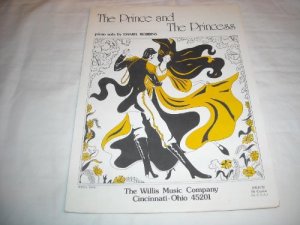 “The music for the prince and the princess is vastly contrasted, so it is easy to determine which character is on the stage. The prince’s music is in quick march style with fine dissonant touches and modulation; that for the princess is slow and singing with more than a hint of Satie. Somewhat out of the ordinary in the way of descriptive pieces, and an excellent teaching and recital number for imaginative players.”
“The music for the prince and the princess is vastly contrasted, so it is easy to determine which character is on the stage. The prince’s music is in quick march style with fine dissonant touches and modulation; that for the princess is slow and singing with more than a hint of Satie. Somewhat out of the ordinary in the way of descriptive pieces, and an excellent teaching and recital number for imaginative players.”
